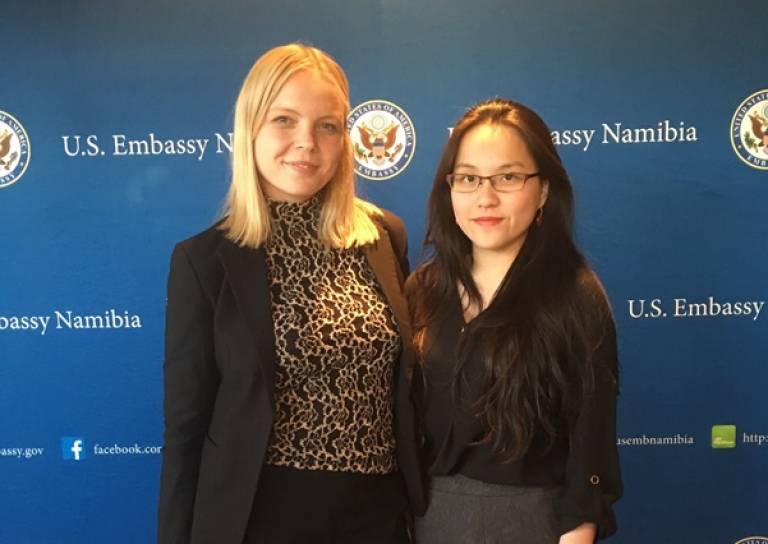LWOB UCL Student Division create guide to tackle gender-based violence & present at UN Conference
6 November 2019
Members of the UCL Lawyers without Borders Student Division were invited to join delegates at the United Nations Office on Drugs and Crime (UNODC) for a five day trial advocacy conference in Windhoek, Namibia in June.

From left to right, Emma Ziegler Steen and Jenna Tan, Student Members of UCL Lawyers without Borders Student Division
On March 1 2019 of 2019 members of Lawyers without Borders Student Division (LWOB) at UCL took part in the annual Rule of Law Innovation Challenge (ROLIC). In collaboration with their mentors at Shearman Sterling LLP, UCL law students Jenna Tan, Antoni Mikocki, Romy Ng, Laure Sty, Lynn Temp, Markéta Lisková and Emma Ziegler Steen designed a booklet which provided practical information on the law intended to aid victims of gender-based violence in Kenya. The UCL team was given the award for “Best Prototype”, and were invited by the competition judges to create similar materials for use in Namibia, to further LWOB’s outreach programme in the country.
After creating a booklet which used accessible language to explain the legal framework surrounding gender-based violence in Namibia, two members of the UCL Student Division, Emma Ziegler Steen and Jenna Tan, were invited to join the LWOB delegation at a 5-day trial advocacy conference in Windhoek, capital of Namibia, in June 2019. Coordinated by LWOB and UNODC, the conference provided a forum in which the students were able to share and explain their findings with other participants, including local and international judges, legal practitioners and other experts.
Emma Ziegler Steen, current president of the UCL LWOB student division explained:
“As part of the training activities, participants of the conference were given copies of the booklet created by the LWOB UCL research team. It was fascinating to get the opportunity to discuss the contents of our booklet with legal practitioners, who work daily to counter gender-based violence in Namibia. Moreover, it was inspiring to learn how the participants intended to share the booklet and its ideas with the populations of their home villages, as LWOB and the UNODC had generously made many copies of the booklet available to each participant. Hopefully, our booklet’s simple language and visual illustrations will be effective in giving the wider Namibian population an understanding of the unique challenges in combatting gender-based violence.”
The trip was made possible with sponsorship from the Centre for Access to Justice and the UCL Law Society.
You can find a link to a blog post authored by Emma and Jenna documenting their experiences here.
About the LWOB Student Division at UCL and the UCL Centre for Access to Justice
The LWOB Student Division at UCL is a Student Led Project overseen by the Centre for Access to Justice at the UCL Faculty of Laws. As part of an international network of student divisions, they aim to provide students the opportunity to engage in rule of law orientated activities through a broad range of events, research, and fundraising activities.
Located within the UCL Faculty of Laws, the Centre for Access to Justice combines innovative teaching and research-based learning with the provision of pro bono legal advice to local communities. Our work predominantly centres around the areas of social welfare, community care, education, and housing law.
UCL Laws has been a leader in access to justice and the incorporation of casework and social justice awareness into the law degree programmes we offer. Working with charity organisations and legal professionals, the Centre provides legal assistance to members of the local community while giving students an opportunity to gain hands on experience in meeting legal needs and critically reflect on the role of law in society.
About Lawyers without Borders
Lawyers Without Borders is a not-for-profit organisation whose mission is to promote rule of law around the world by leveraging and promoting pro bono service to meet the needs of the underserved, build capacity in justice sectors and support transitions and development aimed at protecting human rights, all with a neutral orientation.
About the United Nations Office on Drugs and Crime (UNODC)
UNODC is a global leader in the fight against illicit drugs and international crime. Established in 1997 through a merger between the United Nations Drug Control Programme and the Centre for International Crime Prevention, UNODC operates in all regions of the world through an extensive network of field offices. UNODC relies on voluntary contributions, mainly from Governments, for 90 per cent of its budget.
 Close
Close

